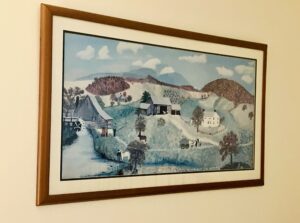
Perfectly Imperfect
I read a good amount of poetry. Some comes to me in literary journals and books, some shows up in various online forums. I’m drawn to writing that is accessible, creative and real. Being a quirky person myself, I also enjoy writing that contains a happy smattering of weirdness. And I don’t mind looking up a word I don’t recognize.
I am not lofty. If you seek poets who are solemn in their craft, those who trail lists of academic achievement like a wedding train on their way down the aisle to meet you, reader, as bridegroom, if you insist on degrees—one, or several—let me save your time. Go elsewhere.
Once in a while I dabble in paint. Acrylics, so far. I want to paint more often. That’s an understatement. I long for it, really, but the days are stubborn in their insistence on offering the same number of 60-minute segments each, and no more. So far, all the other things eat up most of my awake hours. Someday, maybe, this will change.
I took an art class a few years ago, my first and only as an adult. The teacher spent a good chunk of most classes showing his latest work, pulling one or a few aside to look at his website. The class was mixed level, ranging from beginner-esque folks like me to some astonishingly accomplished artists whose work has inhabited many shows and, presumably, now resides in posh private collections.
I announced myself as a neophyte, yet received no direction in terms of tools or color theory or even basic terminology. I found my way by asking other students, or occasionally, when I could grab the teacher’s attention, asking my questions directly.
One night during class the teacher was extolling the virtues of an abstract artist with a Provincetown studio. While he was engaged in finding that artist’s website, he made a reference to Grandma Moses (Anna Robertson Moses, an American folk artist who began painting at the age of 78.) “SOME people call that art,” teacher exclaimed, “but it is nothing of value.” The hair on my arms stood at attention.
I have a large Moses print on my bedroom wall. When I lie in bed as morning brings light I often wander into the picture and sit awhile. The rolling rural landscape soothes me, craving as I do great green fields and simpler times. Anna R. Moses is one of my heroines, a tremendous inspiration to me as a later life poet.
In the realm of notions like loft and craft, master’s degrees and academic pedigree, I suppose I am a naïve poet, much as folk art is sometimes called naïve art. And though I’ve been writing for a good bit of my life, I only began to publish in earnest after I turned 50.
Perhaps someday another late-blooming writer will stumble on one of my poems. Maybe they will find something there—a word, a sentence—that will spark an image that begs to be interpreted. Maybe Late Bloomer will be tired of pushing their creative urges down, weary of the incessant internal yammering of self-doubt that grows fat on comparison. And possibly that one person will decide at last to take up a hammer against the fear and make an opening, jagged and perfectly imperfect, so the art that lives inside them can be finally freed. It will spill messily out into their cupped palms where it can be coaxed into the colors and shapes that only those hands and that heart can form, and the world—the world will be richer for it.
–Melinda Coppola